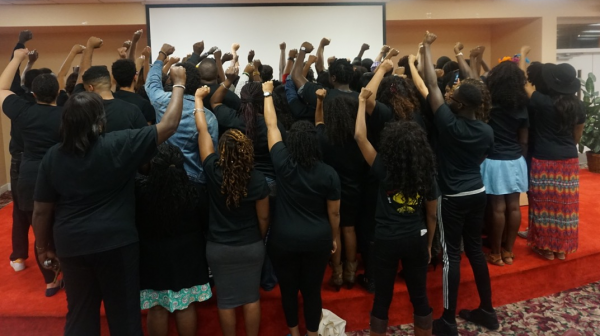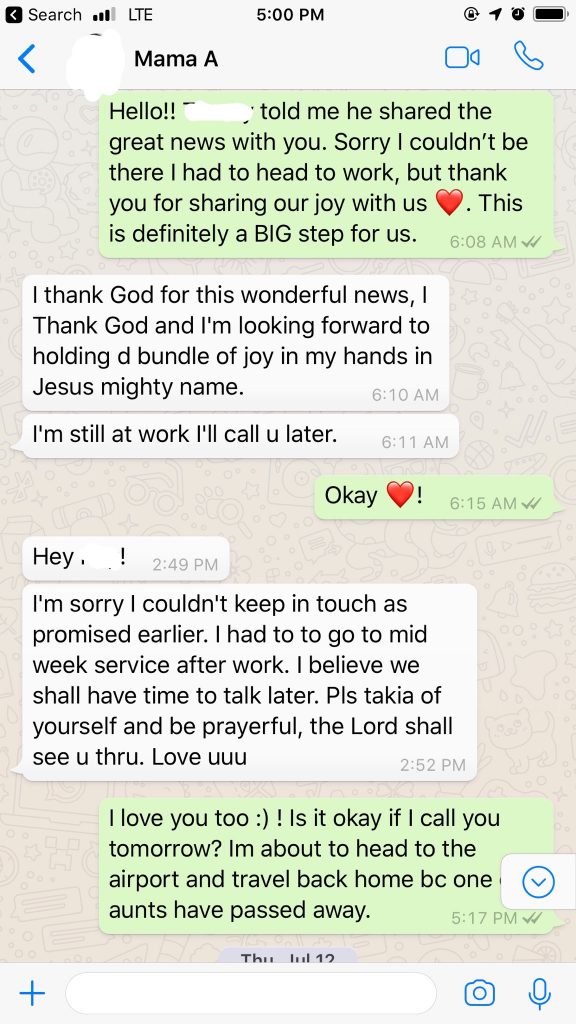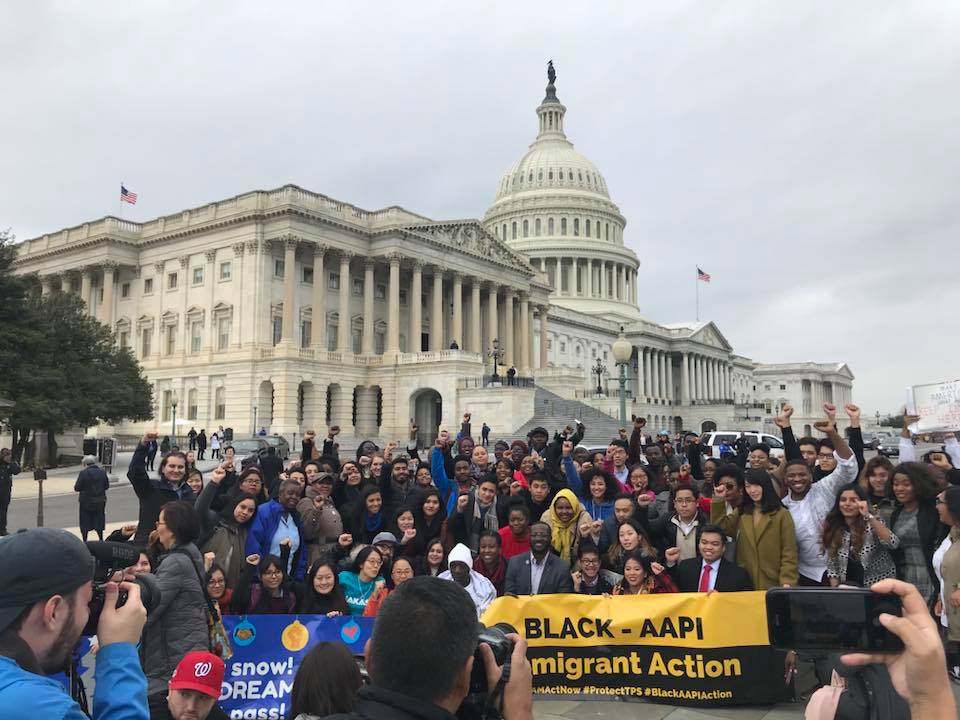
(UndocuBlack Network/Facebook)
By Carla Pineda
 Editor’s note: This article is part of “We the Immigrants,” a Community Based News Room (CBNR) series that examines how immigrant communities across the United States are responding to immigration policies. The five-part series is supported by a Solutions Journalism Network Renewing Democracy grant.
Editor’s note: This article is part of “We the Immigrants,” a Community Based News Room (CBNR) series that examines how immigrant communities across the United States are responding to immigration policies. The five-part series is supported by a Solutions Journalism Network Renewing Democracy grant.
The truth became clear to Sadat Ibrahim early. At the age of 18, he knew his life would be difficult as a queer person in Ghana.
“It’s against the law, and it’s terrible back home when we are labeled LGBT,” Ibrahim says. “Most LGBT people live a secret life.”

He was attacked by a vigilante group in August 2015 and fled the country soon after, fearing for his life. He traveled through a few Latin American countries until he was detained in his attempt to cross the United States-Mexico border.
After spending two years and seven months in the prison-like conditions of detention centers, he was released July 25. His asylum case is currently under review. If it wasn’t for a fellow detainee who overheard his story and handed him phone numbers for immigrant rights groups, he could still be detained—or could be back in Ghana.
Now that he’s out, he communicates with his legal team daily. A pastor purchased a cell phone for him, and without it, he would feel just as out of touch as he felt in detention.
“I’d be lost in the world,” he concedes.
Undocumented black migrants are building an informal network to help each other navigate their uncertain immigration status in the U.S. While they are inclined to share immigration information by word of mouth, and are doing so at basic one-on-one and grassroots levels, they also are using technology to spread the word within the digital communities they trust. Whether they use WhatsApp to call family back home, Instagram to get news, or Facebook to live stream legal information sessions, black immigrants are using innovative methods to communicate—and to organize.
People are finding creative ways to respond to the unique challenges of being black and undocumented in the U.S., according to immigrant rights groups. Among those challenges is that black immigrants are underrepresented in the immigration narrative. Guerline Jozef, the president of the Haitian Bridge Alliance, which visits detention centers regularly to connect detainees with resources, is working to change this reality.
“The black immigrant community is really suffering because of lack of representation and legal assistance,” she tells me. “They are forgotten, they are abused and oppressed even within the system.”
The word “invisible” is used to describe black immigrant communities. They tend to be overlooked because their groups are small and segmented compared to larger migrant groups. Nekessa Opoti of UndocuBlack, an organization focused on assisting undocumented black people in the U.S., wants these minority voices to be heard and their perspectives to be shared.
“We are so few that we haven’t built the mass movements that nonblack immigrants have,” says Opoti, a Kenyan immigrant. “Systems don’t work for us, so we rely on each other.”
Another challenge faced by black immigrants is that they are disproportionately criminalized, say immigrant rights groups. Living in a country known for historic racial discrimination, especially during a presidential administration that is explicitly implementing a white supremacist agenda, black immigrants are vulnerable to deportation for many of the same reasons that black Americans are susceptible to incarceration. They have landed in a country where black individuals comprise 12 percent of the U.S. population, yet they make up 33 percent of the prison population, reports the Pew Research Center.
This overrepresentation spills over into the immigration deportation system. While only 5.4 percent of the undocumented population is black, blacks make up 20.3 percent of all the immigrants facing deportation on criminal grounds, reports the Black Alliance for Just Immigration. The minute an immigrant is stopped by the police for an offense as minor as a broken taillight, immigrants are subject to several federal criminal enforcement programs designed to funnel individuals into deportation proceedings—if local law enforcement officers decide to take on the duties of federal immigration enforcement .
Tunde Ogunade, a Nigerian immigrant who lives in Los Angeles, has not been funneled into the deportation system, but he has been at the gunpoint of racial profiling.
“I’ve gone through more racial stuff than immigration stuff,” he admits.
He recalls an incident when three police cars pulled up on him as he walked down the street.
“I was just nervous, and the lady pulls out her gun at me. She said, ‘He has a gun in his back pocket!’ ” Ogunade remembers.
Upon search, the officers found the alleged gun was only his cell phone.
“It made me feel like I’m a target,” he says. “Nigeria isn’t safe, but we don’t have death threats like that.”
Amid the challenges he has experienced in this country, a positive Ogunade praises technology for the opportunities it presents.
“For the past seven years, my mom has called me everyday,” he states fondly.

They call and text via WhatsApp, a mobile app preferred by migrants around the world because it is accessible and secure. Ogunade’s wife, who is currently expecting their first child, now uses WhatsApp regularly to share details about the baby with her mother-in-law.
Services like WhatsApp also give people the opportunity to communicate with U.S.-based activists who can help them find missing migrants. Jozef recalls the first phone call she ever received.
“I received the call in November of 2016 from a mother in Boston asking me to find her daughter, who supposedly crossed the border, and she never heard from her again,” Jozef said.
She decided to visit the daughter when she found her at a detention center in Southern California, and she was surprised to find another 25 Haitian migrants there. She began visiting the others, sending books, depositing money into their accounts so they could make phone calls, finding them legal assistance and connecting them to resources when they were released. The word began to spread, and she started receiving calls from families in the U.S. and Haiti, plus calls from detainees across the country. The most rewarding part for her has been offering a human connection to migrants who felt forgotten.
“A young man had been there seven months, and I was the first visitor he had,” Jozef says. After she told him, “I came, I saw your name, and I wanted to let you know we are thinking about you and you are not alone,” he started crying in disbelief.
Ibrahim developed stress-induced glaucoma and insomnia during his detention period, but the isolation can be the most debilitating part.
“I’ve seen people lose their minds,” he says. “And they don’t pay attention to you.”
He split his two years and seven months between detention centers in Texas and Georgia, sometimes without access to a shower or being able to brush his teeth.
“They treat us like animals,” he says. “You are controlled by authorities, and when you try to say something, they send you to the ‘hole.’”
He requested refugee status and was denied, and just before being deported, a fellow detainee shared phone numbers to different immigrant rights groups that ended up helping him. The network of resources available by word of mouth, such as the services offered by activists like Jozef, have saved black immigrants like Ibrahim from facing poverty, enslavement, or even death upon return to their home countries.

But word of mouth only goes so far without access to the simplest technology, says Cathey Ambush, a volunteer with Immigrant Families Together. She has experienced helping recently released migrants at the bus stations or airports where they were dropped off by authorities.
“Texas detention centers will take moms from detention centers to the Greyhound bus station,” she says. “They’ll drop them off in groups in the morning, regardless of what time they’re leaving, just with the clothes on their back and maybe a box lunch.”
|
|
From there, they have no way to communicate with the family members who are expecting them—sometimes across the country—if they are stranded due to flight or bus delays. Although many migrants use cell phones to help guide their journey on their way to to the U.S., many don’t have a phone when they are released from detention (it’s rare for Immigration and Customs Enforcement to return cell phones, Ambush says).
For immigrants who do have access to cell phones, basic communication becomes easier, though finding communities they trust can be trickier. Black migrants tend to seek out resources within their church or cultural communities, according to the Rev. Dieufort J. Fleurissaint, of the nonprofit Haitian-Americans United. He says community assemblies, independence day celebrations and events that make black migrants feel at home are important.
“Church is a welcoming environment spiritually,” Fleurissaint adds. “Their culture is there. Their language is there. Even though we stay mobilized, we pray for God’s intervention.”
It’s within these communities that trust is built and information is shared, says Opoti.
“Things that happen are underground,” she asserts. “People organize quietly.”
Carl K. Lipscombe, deputy director of Black Alliance for Just Immigration, says that because black-serving immigration organizations are “incredibly under-resourced,” technology is key in getting the word out.
Ogunade and his wife get a lot of their news about immigration and fellow Nigerians through the Instagram accounts of people and sources they trust, such as Amplify Africa and its partners.
“I went on social media, clicked and saw where I could go renew my visa,” he says. “This was very clutch for me because if I didn’t know that, I would have gone all the way to Maryland.”
UndocuBlack has found successes in mobilizing their allies through hashtags and graphics on Instagram. When Banny “Papa” Doumbia was detained and scheduled for deportation back to the Ivory Coast after living in the U.S. for 28 years, UndocuBlack helped his daughters spread the word about protests that ultimately helped keep him in the U.S. Several groups mobilized together using the social media hashtag #FreePapaDoumbia.
In other cases, UndocuBlack has made direct calls to action, mobilizing dozens of people to make phone calls to demand justice for individual immigration cases. One posted called on people to contact their representatives and demand they stop the deportations of black Mauritanians.
“We’ve heard from ICE asking, ‘Why did you give our phone number out?’” Opoti said.
Other campaigns are broader and focused on educating immigrants amid a flurry of misinformation. Black immigrants can fall prey to fraudulent schemes when they are misinformed, says Fleurissaint.
Haitian-Americans United uses Facebook often to manage “know your rights” and legal information sessions. For one campaign, they partnered up with Canadian radio to educate their audience around the Temporary Protected Status backlash that caused some black migrants to flee to Canada.
But technology provides more than just communication tools.
“Access to technology really helps connect migrants to communities when they arrive,” Lipscombe said. “That could be the make-or-break factor. It’s the difference of them having somewhere to live or not.”
Carla Pineda is a digital producer at KCETLink in Southern California.
This article and all “We the Immigrants” stories can be reprinted/republished in their entirety with a credit to Law@theMargins and a link to the original story on CBNR.
Community Based News Room publishes the stories of people impacted by law and policy. Do you have a story to tell? Please contact us at CBNR. To support our Community Based News Room, please donate here.




